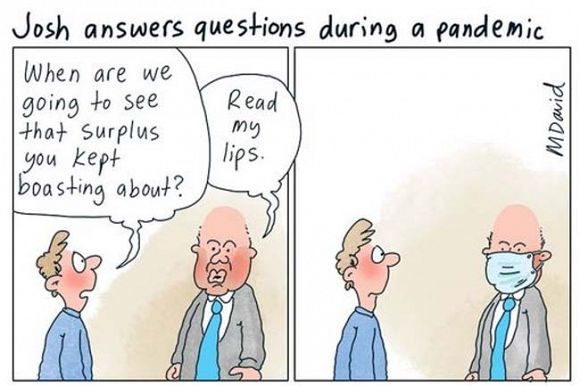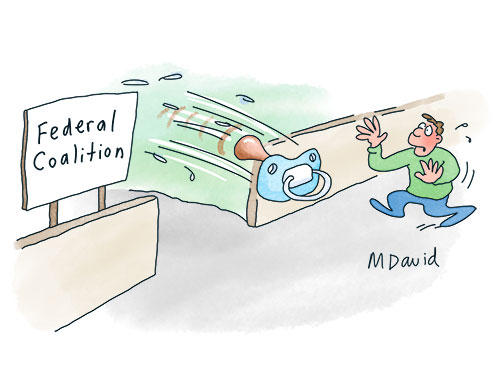The 2023 Budget offers cost-of-living relief and goes some way towards tackling entrenched poverty but is it enough? Michelle Pini and Dave Donovan report.
THERE IS NO DOUBT that we expect more from Labor governments. This, of course, means that since the bar is set higher, the propensity for failure is greater.
It took almost ten long years of gross mismanagement, including many broken promises of budget surpluses, unprecedented erosion of public trust, callous disregard for the suffering of vulnerable Australians and internal party unrest leading to three changes of leader before Australia finally voted out the Abbott/Turnbull/Morrison (ATM) Coalition Government.
When contrasted with the previous Labor Administration, when the economy was well managed (as international accolades attest) and many progressive steps taken (albeit tentatively) to tackle entrenched inequality and climate change, for example, it becomes clear that it only took the three changes of leader part for the last ALP Government to be thrown out of office for a decade.
So, it comes as no surprise that the Albanese Government, reliant as it is on that elusive electoral “centre”, must maintain a balance between its traditional values of social equity and the hard realities of fiscal management, particularly during a period of economic unease.
Given that the Coalition was unable to provide one, Chalmers’ projected small budget surplus may, as Laura Tingle suggested, finally put an end to the “Labor-are-bad-economic-managers” trope, which IA has been debunking over many years.
And, if the AFR’s report on Budget winners and losers is any indication, it would appear that a large portion of that middle-class centre – and thus some of the accompanying media attack dogs – have been appeased, at least temporarily.
Labor seems to have managed that narrow line between providing social reforms, while still catering for the middle-class sector, such as small businesses and home buyers.
SOMETHING EXTRA
There are cost-of-living relief measures for the most disadvantaged Australians, including rent relief, reduced childcare costs, energy bill assistance, lower costs for doctor visits and PBS medications, increased payments and relaxed eligibility, plus extended payments until the youngest child turns 14 (up from 8 years of age) for single parent assistance, and (admittedly minor) increases to JobSeeker payments.
Positive steps have also been taken in the areas of women's safety, addressing family, domestic and sexual violence, and the gender pay gap.
These measures, while vast improvements, do not go far enough, especially since we know that we have the capacity to lift everyone out of poverty with one fell swoop of the Treasurer’s pen. With an expected Budget surplus this year, together with the knowledge that giving more to those with the least also eases inflation, now would seem like a great time to do this one small thing that would transform the lives of 3.3 million Australians currently living in poverty.
These things may not go far enough but as already mentioned, the ALP also does not want to burn all its political capital since, as Otto von Bismarck pointed out, 'Politics is the art of the possible, the attainable — the art of the next best'.
We remain optimistic, then, that these initial measures will be increased exponentially to eventually do away with Australia's institutionalised poverty — hopefully by the next budget.
LUCKED OUT
Of course, the Albanese Government may have been prudent for now, but no amount of practicality or responsible fiscal management on the part of an ALP government will ever assuage the mega-rich. This fact does not appear to have escaped Chalmers, since tax dodgers, employers evading superannuation and big gas polluters are all losing out in this Budget.
And then there’s always that portion of The Australian’s readership for whom we should spare a thought, since they also apparently lucked out, such as the wealthy pharmacists’ lobby or "suffering" young couples, such as this featured pair who are:
‘…both engineers and middle-income earners … saving for their dream wedding and an investment property as the nation’s cost of living crisis continues.’
No help for essentials like property portfolios and lavish weddings? Not a bad budget, then, all things considered.
STUBBY SURPLUS
But a note of caution should be sounded about the widespread sense of satisfaction among rusted-ons and – even the slightly tarnished – about Labor forecasting a slim surplus in the forthcoming fiscal year.
A few years ago, Scott Morrison’s bungling excuse for an administration also forecast a budget surplus, even printing cups, stubby coolers and fridge magnets, among other public revenue-sapping paraphernalia, with the vainglorious words “Back in Black”! Can anyone forget the feverish excitement from the media that Morrison had somehow miraculously managed to bring the budget back into a surplus ─ sometime in the future?
Of course, it was all complete bullshit. That Budget took the steepest nosedive, outside of the world war years, Australia had ever seen, when the numbers were released 15 months later. IA still has one of the stubby coolers — which, unsurprisingly, has never kept a single beer cold.
So, a forecast surplus is not a surplus. And without labouring the ever-intelligent IA reader with the pesky assumptions used to produce this, or indeed any, model of events that have not happened yet, it is a form of prophecy that has, based on past performance, shown rather less accuracy than astrology, reading goat entrails or Keno.
And if you don’t believe IA, note the following graph, which shows 15 of the last 20 budgets have forecast GDP growth in excess of the final actual result. Apart from the years where our bean-counting Nostradamus’ almost comically understated it.

Well, no one’s perfect.
The lesson is: under-promise and over-deliver.
Given there is little political capital to be gleaned this far out from an election by a tiny surplus if Chalmers had adopted an even more pessimistic set of assumptions and forecast a small deficit, and then come in with a surplus, he would be seen in the future as a genius. Now, if the economic winds do not favour him and he comes in with a deficit, he will just confirm the standard archetype of Labor being poor with money.
Chalmers must really be confident of a big surplus since there is no doubt that we expect more from Labor governments.
This editorial was originally published as part of the Independent Australia weekly newsletter – usually only available to subscribers – and may be read online in the IA members-only area.
You can follow, on Twitter, IA managing editor Michelle Pini @vmp9 and founder and publisher Dave Donovan on @davrosz. Follow Independent Australia on Twitter @independentaus and on Facebook HERE.
Related Articles
- Labor's Budget takes tech industry to the next level
- EDITORIAL: Budget Labor-ing under the weight of expectation
 This work is licensed under a Creative Commons Attribution-NonCommercial-NoDerivs 3.0 Australia License
This work is licensed under a Creative Commons Attribution-NonCommercial-NoDerivs 3.0 Australia License
Support independent journalism Subscribe to IA.















